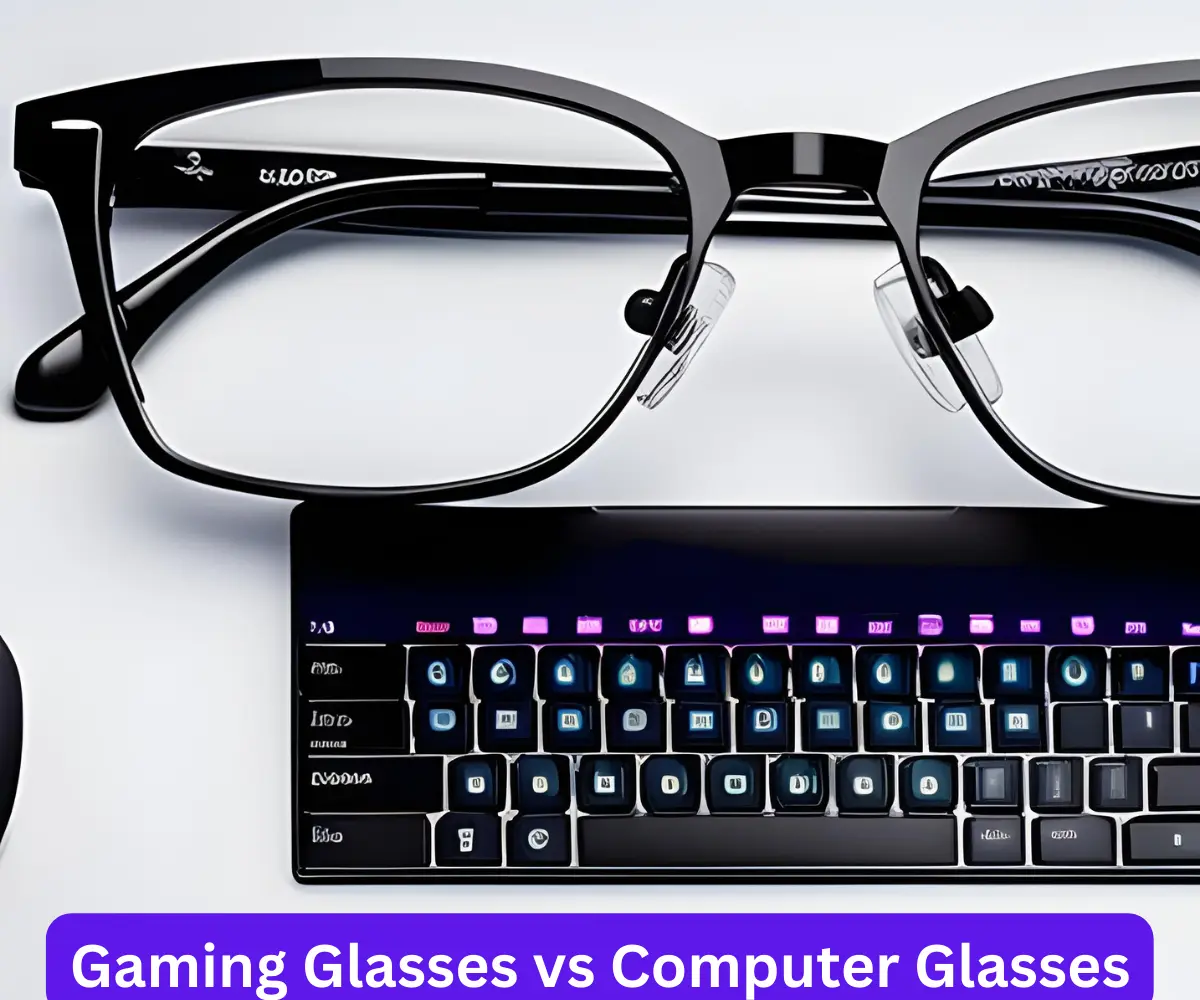As technology becomes increasingly integrated into our daily lives, it is essential to protect our eyes from the strain caused by prolonged screen time. This article is for anyone who spends hours in front of a screen, whether for work or leisure, and is looking for ways to alleviate eye strain and improve visual comfort.
Here you will explore the differences between gaming glasses and computer glasses, their history, and how they can benefit your eyes and overall well-being.
A Brief History of Screen-Protective Eyewear
Topics Covered In This Article
- 1 A Brief History of Screen-Protective Eyewear
- 2 Gaming Glasses: Enhancing Performance and Visual Comfort
- 3 Computer Glasses: A Solution for the Digital Workforce
- 4 A Comparative Analysis: Gaming Glasses vs Computer Glasses
- 5 Implications for Individuals and Society
- 6 Differences of Gaming Glasses vs Computer Glasses
- 7 Key similarities of gaming glasses vs Computer glasses
- 8 FAQs
- 9 Conclusion on Gaming Glasses VS Computer Glasses:
The story of gaming glasses and computer glasses began in the early 2000s when people started to recognize the harmful effects of prolonged exposure to screens.
As people began to spend more time in front of computers, cases of eye strain, dryness, and fatigue became more prevalent.
In response, eyewear manufacturers started designing glasses specifically for screen use, aiming to alleviate these symptoms.
Gaming Glasses: Enhancing Performance and Visual Comfort
Gaming glasses are designed to improve the gaming experience by enhancing visual clarity, contrast, and reducing screen glare. These glasses typically have a yellow or amber tint to block out blue light, which has been linked to disrupted sleep patterns and digital eye strain.
Benefits of Gaming Glasses:
- Reduced eye strain, dryness, and fatigue
- Enhanced visual contrast and clarity
- Improved focus and reaction time
- Better sleep quality due to reduced blue light exposure
Computer Glasses: A Solution for the Digital Workforce
Computer glasses, on the other hand, are designed for general computer use and cater to the needs of those who spend long hours in front of screens for work or study. These glasses often have a clear or lightly tinted lens that blocks a portion of blue light and may include an anti-reflective coating to reduce glare.
Benefits of Computer Glasses:
- Reduced eye strain, dryness, and fatigue
- Minimized glare from screens
- Potential improvement in sleep quality due to reduced blue light exposure
A Comparative Analysis: Gaming Glasses vs Computer Glasses
While both gaming glasses and computer glasses serve the purpose of protecting your eyes from the adverse effects of screens, they cater to different target audiences and have some key differences.
Target Audience:
Gaming glasses: Gamers who require enhanced visual performance during gameplay
Computer glasses: Professionals and students who spend long hours in front of screens
Lens Tint:
Gaming glasses: Yellow or amber tint to enhance visual contrast and block blue light
Computer glasses: Clear or lightly tinted lens to block a portion of blue light
Anti-Reflective Coating:
Gaming glasses: May or may not include an anti-reflective coating
Computer glasses: Often include an anti-reflective coating to reduce glare
Implications for Individuals and Society
The widespread use of gaming glasses and computer glasses has the potential to improve the quality of life for those who spend a significant amount of time in front of screens. By reducing eye strain, fatigue, and the risk of developing more severe vision issues, these glasses can promote healthier screen habits and contribute to overall well-being.
However, it’s crucial to remember that glasses alone cannot eliminate the risks associated with prolonged screen time. It is essential to practice good screen hygiene, such as taking regular breaks and adjusting your screen settings to reduce strain on your eyes.
Differences of Gaming Glasses vs Computer Glasses
| Feature | Gaming Glasses | Computer Glasses |
| Target Audience | Gamers | Professionals, Students |
| Lens Tint | Yellow or Amber | Clear or Lightly Tinted |
| Blue Light Blocking | High | Moderate |
| Visual Contrast | Enhanced | Standard |
| Anti-Reflective Coating | May or may not be present | Often included |
| Glare Reduction | Varies, depends on the specific model | Typically included |
| Eye Strain Reduction | Yes | Yes |
| Dryness & Fatigue | Reduced | Reduced |
| Sleep Quality | Potential improvement | Potential improvement |
| Focus on Visual Comfort | Primarily for gaming performance | Primarily for long-duration screen use |
Key similarities of gaming glasses vs Computer glasses
| Feature | Gaming Glasses | Computer Glasses |
| Purpose | Protect eyes | Protect eyes |
| Blue Light Protection | Yes | Yes |
| Eye Strain Reduction | Yes | Yes |
| Dryness & Fatigue | Reduced | Reduced |
| Sleep Quality | Potential improvement | Potential improvement |
| Screen Glare Management | Varies | Typically included |
FAQs
Are blue light glasses better than computer glasses?
Blue light glasses and computer glasses are often used interchangeably, but there can be some differences. Blue light glasses primarily focus on blocking blue light emitted by digital screens, while computer glasses may have additional features like anti-reflective coatings to reduce glare.
The choice between the two depends on your specific needs and the amount of time spent in front of screens.
If your primary concern is blue light exposure, blue light glasses may be a better fit.
However, if you’re looking for additional features to enhance visual comfort, computer glasses could be more suitable.
Are gaming and computer glasses the same?
Gaming and computer glasses are not the same, although they share some similarities. Both types of glasses are designed to protect your eyes from the negative effects of screen exposure.
The primary difference between the two lies in their target audience and lens features.
Gaming glasses are specifically designed for gamers who require enhanced visual performance during gameplay, often featuring a yellow or amber tint to improve visual contrast and block blue light.
Computer glasses cater to professionals and students who spend long hours in front of screens, often having a clear or lightly tinted lens to block a portion of blue light and an anti-reflective coating to reduce glare.
Do computer glasses work for gaming?
Computer glasses can offer some benefits for gaming, such as reduced eye strain, dryness, and fatigue, as well as minimized glare from screens.
However, they may not provide the same level of visual enhancement that gaming glasses offer, such as improved contrast and clarity.
If you’re an avid gamer seeking the best visual experience, gaming glasses might be a better choice.
For casual gamers or those who primarily use screens for work or study, computer glasses may suffice.
Conclusion on Gaming Glasses VS Computer Glasses:
Gaming glasses and computer glasses each have their unique benefits and are designed for different purposes. Consider your specific needs and the amount of time you spend in front of screens to make an informed decision. Regardless of the type of glasses you choose, remember to supplement your eyewear with healthy screen habits and regular eye check-ups to maintain optimal eye health.
Also Read:
Can You Wear Gaming Glasses All Day?
Do Gaming Glasses Prevent Red Eyes?
How to Tell if Glasses Block Blue Light
Does Mobile Games Improve Eyesight?

Robert Perry is a leading expert in the world of eyewear. His wealth of experience and unique insight in the realm of gaming glasses, swimming goggles, sunglasses, eyeglasses, and computer glasses has set him apart in the industry.
A keen observer of daily fashion styles and the utility of glasses in various lifestyles, Perry is passionate about empowering individuals with knowledge on eyewear selection. He is known for his thorough, clear, and relatable analysis, making it easier for readers to find the perfect glasses for their specific needs.
Perry’s writings consistently reflect his understanding of both function and fashion, affirming his position as an influential figure in the eyewear community.

